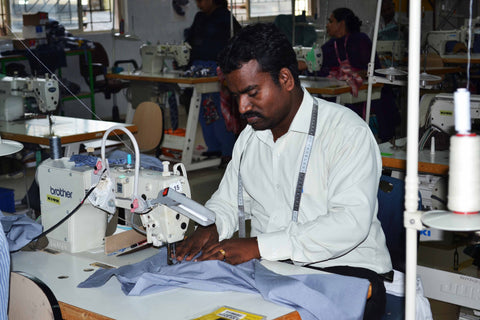Why organic cotton?
We're still celebrating Organic September so we thought we'd share what the Soil Association says about the benefits of organic cotton. It's a bit long. But worth it.
- It's better for the farm environment. Organic fibres are grown without the use of synthetic fertilisers or toxic pesticides. By building soil fertility naturally through the use of compost and manure organic farmers help lock CO2 into the soil, helping mitigate climate change, and they also avoid the greenhouse gas emissions associated with energy intensive fossil-fuel based fertilisers. It also avoids the use of the toxic pesticides that, in non-organic systems, are responsible for poisoning wildlife and rivers, as well as killing an estimated 16,000 people each year.

Some Arthur & Henry farmers loading their cotton
- It's better for workers in the developing world. By avoiding toxic pesticides cotton workers benefit by avoiding the associated health problems and deaths common in non-organic cotton production. Avoiding pesticides also reduces production costs and farmer debts – the burden of pesticide debt has resulted in thousands of suicides in the developing world.
- It avoids GM. GM is banned in organic systems – an estimated 30% of all cotton grown worldwide is genetically modified. GM cotton poses a potential risk to wildlife and human health, as well as exposing farmers to unnecessary expense – Greenpeace research in South India in 2009 showed that genetically modified Bt cotton did not result in significantly higher yields than organic cotton, but cost farmers twice as much to produce as organic.
- It doesn't use harmful manufacturing chemicals. Our standards ensure that the chemicals used in processing textiles meet strict requirements on toxicity and biodegradability, and textile manufacturers must also have a waste water treatment plant and a sound environmental policy. In contrast non-organic manufacture uses tens of thousands of acutely toxic chemicals, including heavy metals, formaldehyde and aromatic solvent, many of which are classified as hazardous by the World Health Organisation (WHO) and have been associated with cancer, birth defects and hormonal and reproductive effects in wildlife and humans.
- Factory conditions are higher. Poor working conditions and rights in the garments industry are common place and well documented. Manufacturers of Soil Association/GOTS certified organic textiles must meet social criteria based on the International Labour Organisation (ILO) conventions. These cover minimum wages, working hours, child labour, freedom of association, discrimination, harsh or inhumane treatment and more.

Making shirts in our factory in Bangalore
